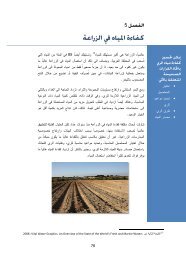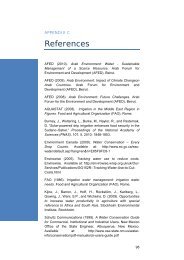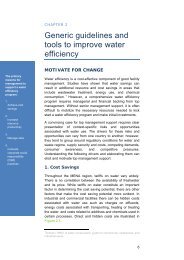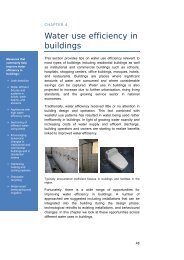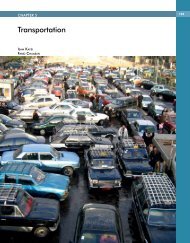Impact of Climate Change on Arab Countries - (IPCC) - Working ...
Impact of Climate Change on Arab Countries - (IPCC) - Working ...
Impact of Climate Change on Arab Countries - (IPCC) - Working ...
You also want an ePaper? Increase the reach of your titles
YUMPU automatically turns print PDFs into web optimized ePapers that Google loves.
ARAB ENVIRONMENT: CLIMATE CHANGE<br />
XIII<br />
It is no l<strong>on</strong>ger a questi<strong>on</strong> <str<strong>on</strong>g>of</str<strong>on</strong>g> whether or not climate change is happening. The<br />
questi<strong>on</strong> now is how climate change will manifest itself regi<strong>on</strong>ally and locally and<br />
what can be d<strong>on</strong>e about it. For governments, the key issue is balancing shortterm<br />
ec<strong>on</strong>omic growth with l<strong>on</strong>g-term sustainable development. A complicating<br />
factor is the scientific uncertainty surrounding climate change: the exact impacts<br />
<str<strong>on</strong>g>of</str<strong>on</strong>g> climate change and their locati<strong>on</strong>s cannot be predicted with perfect accuracy,<br />
nor can so-called “tipping points” – points bey<strong>on</strong>d which climate changes are<br />
irreversible – be fully and accurately predicted.<br />
However, this AFED Report argues that the climate change challenge should be<br />
treated like any other decisi<strong>on</strong> made in the face <str<strong>on</strong>g>of</str<strong>on</strong>g> uncertainty: a risk-management,<br />
or insurance, framework. Utilizing the insurance principle, as l<strong>on</strong>g as there<br />
is sufficient likelihood <str<strong>on</strong>g>of</str<strong>on</strong>g> significant damage, we take measured anticipatory<br />
acti<strong>on</strong>, the costs <str<strong>on</strong>g>of</str<strong>on</strong>g> which are fully justified. What is required is an h<strong>on</strong>est evaluati<strong>on</strong><br />
<str<strong>on</strong>g>of</str<strong>on</strong>g> the level <str<strong>on</strong>g>of</str<strong>on</strong>g> insurance deemed necessary to protect – with an acceptable<br />
amount <str<strong>on</strong>g>of</str<strong>on</strong>g> certainty – against the impacts <str<strong>on</strong>g>of</str<strong>on</strong>g> climate change. Uncertainty is not<br />
and should not be an excuse for inacti<strong>on</strong>.<br />
As stated previously, effectively battling climate change will require c<strong>on</strong>certed<br />
global acti<strong>on</strong>. The divisi<strong>on</strong> <str<strong>on</strong>g>of</str<strong>on</strong>g> resp<strong>on</strong>sibilities – “comm<strong>on</strong> but differentiated<br />
resp<strong>on</strong>sibilities,” according to the UNFCCC – runs into issues <str<strong>on</strong>g>of</str<strong>on</strong>g> equity. How<br />
should the different resp<strong>on</strong>sibilities be fairly distributed Without adequately<br />
answering this questi<strong>on</strong>, any climate change agreement will be neither acceptable<br />
nor sustainable. At the same time, any acceptable and sustainable climate change<br />
agreement will also have to be effective. It will need to be acceptable to all,<br />
respected by all, sufficiently ambitious, and flexible enough to adjust to changing<br />
scientific and technological informati<strong>on</strong>.<br />
While this report endorses the view that developed countries will need to take the<br />
lead in global climate change acti<strong>on</strong>, developing countries will also need to play<br />
their part. Moreover, while all countries have a legitimate right to ec<strong>on</strong>omic<br />
development, this need not necessarily c<strong>on</strong>flict with strategies to reduce emissi<strong>on</strong>s.<br />
With the help <str<strong>on</strong>g>of</str<strong>on</strong>g> developed countries, developing countries should be able<br />
to reduce their carb<strong>on</strong> intensity to set them <strong>on</strong> a path to sustainable development.<br />
This should be achieved through effective mechanisms <str<strong>on</strong>g>of</str<strong>on</strong>g> technological<br />
and financial transfers and investment, in a legally binding treaty.<br />
Looking ahead to the negotiati<strong>on</strong>s in Copenhagen, it is clear that developing<br />
countries are hesitant to commit to any obligati<strong>on</strong>s that place significant restricti<strong>on</strong>s<br />
<strong>on</strong> their ec<strong>on</strong>omic growth. They point to their priority resp<strong>on</strong>sibilities to<br />
provide employment opportunities and better standards <str<strong>on</strong>g>of</str<strong>on</strong>g> living for their populati<strong>on</strong>s.<br />
At the same time, developed countries, in particular the United States, will not<br />
accept a climate change agreement in which the major emitters am<strong>on</strong>g the developing<br />
countries are allowed to c<strong>on</strong>tinue with “business as usual” development.<br />
There must be give and take between the two groups, developed and developing.<br />
Since the successful meeting <str<strong>on</strong>g>of</str<strong>on</strong>g> the C<strong>on</strong>ference <str<strong>on</strong>g>of</str<strong>on</strong>g> the Parties in Bali in December<br />
2007, little progress has been made in the negotiati<strong>on</strong>s for a post-2012 agreement<br />
<strong>on</strong> climate change. The Bali Acti<strong>on</strong> Plan/Road Map calls for a l<strong>on</strong>g-term goal<br />
for global emissi<strong>on</strong>s reducti<strong>on</strong> and mitigati<strong>on</strong> acti<strong>on</strong>s by developed and developing<br />
countries. Besides mitigati<strong>on</strong>, it also includes adaptati<strong>on</strong>, reforestati<strong>on</strong>, tech-



